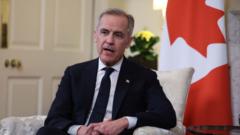Canadian Prime Minister Mark Carney, recently elected, is reportedly poised to call a national election on April 28, signaling a decisive political move amid escalating trade tensions with the United States. Sources indicate that Carney, who succeeded Justin Trudeau as leader of the Liberal Party, may dissolve Parliament as soon as this Sunday, paving the way for a five-week campaign that could reshape Canada's political landscape.
Carney Expected to Announce Snap Election Amid US-Canada Trade Tensions

Carney Expected to Announce Snap Election Amid US-Canada Trade Tensions
As Canada navigates a tumultuous trade relationship with the US, Prime Minister Mark Carney prepares for a potential election call.
The election's timing is crucial as businesses in Canada grapple with the fallout from a trade dispute, particularly following President Donald Trump's announced intentions to impose additional tariffs on Canadian goods. Carney, a seasoned former central banker, plans to position himself as the most capable candidate to confront these trade challenges.
Given the backdrop of heightened trade tensions, analysts believe a condensed electoral campaign may work to Carney's advantage. As discussions increasingly center on Trump's aggressive trade policies, including his aspirations of making Canada "the 51st state," the Prime Minister aims to uphold Canada's tariff agreements if the US implements universal tariffs.
The Conservative party, led by Pierre Poilievre, finds itself in a volatile polling situation; despite having a significant lead prior to the tariff threat, recent surveys show a narrowing race between the Liberals and Conservatives. As Canadians prepare for the forthcoming election, they will also contend with other parties, including the Bloc Quebecois and the New Democrats, who are shaping the competitive political landscape.
As the election approaches, Carney's handling of the US-Canada relationship and his responses to Trump’s policies will be instrumental in winning the electorate's favor.
Key moments on Carney's journey from banker to politician illustrate his readiness as he embarks on this critical campaign phase, asserting his commitment to protect Canadian interests during a pivotal time for the nation.
Given the backdrop of heightened trade tensions, analysts believe a condensed electoral campaign may work to Carney's advantage. As discussions increasingly center on Trump's aggressive trade policies, including his aspirations of making Canada "the 51st state," the Prime Minister aims to uphold Canada's tariff agreements if the US implements universal tariffs.
The Conservative party, led by Pierre Poilievre, finds itself in a volatile polling situation; despite having a significant lead prior to the tariff threat, recent surveys show a narrowing race between the Liberals and Conservatives. As Canadians prepare for the forthcoming election, they will also contend with other parties, including the Bloc Quebecois and the New Democrats, who are shaping the competitive political landscape.
As the election approaches, Carney's handling of the US-Canada relationship and his responses to Trump’s policies will be instrumental in winning the electorate's favor.
Key moments on Carney's journey from banker to politician illustrate his readiness as he embarks on this critical campaign phase, asserting his commitment to protect Canadian interests during a pivotal time for the nation.





















